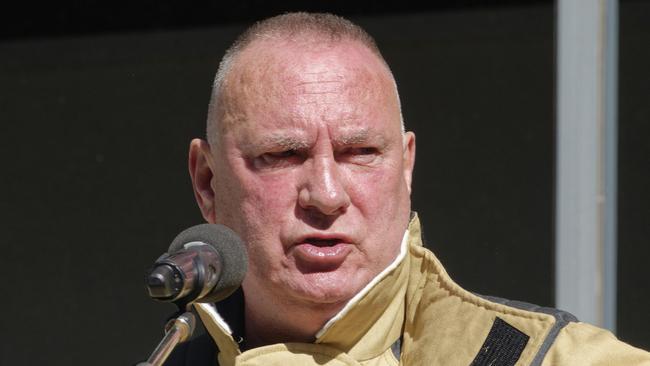Firefighters union boss attacks Labor’s CFMEU demerger laws
The union leader says the laws will be exploited by factional rivals in unions and future Coalition governments to try to dismantle unions.

Veteran United Firefighters Union leader Peter Marshall has strongly criticised the Albanese government’s new CFMEU demerger laws as a dangerous precedent that will be exploited by factional rivals in unions and by future Coalition governments to try to dismantle unions.
Backing CFMEU Victorian leader John Setka’s demand to remove the former building watchdog Stephen McBurney as the head of AFL umpiring, Mr Marshall said the ACTU support for the new demerger laws was “sheer hypocrisy” given its long-held policy of promoting union mergers to create so-called “super unions”.
It came as Greens leader Adam Bandt backed CFMEU national secretary Zach Smith’s criticism that the laws, allowing the union’s manufacturing division to vote to split away, risked setting a “dangerous precedent for anti-worker ideologues in future Coalition governments to break up unions”.
“If what you’re going to do is actually come in here and legislate specifically for one union, I say to Labor again: you have just opened the door,” Mr Bandt told parliament.
“Again, ask yourself: why is it that Liberal speaker after Liberal speaker is coming in here and saying what a terrific idea this is?” With the Coalition expected to support the bill, and not calling for a Senate inquiry, it could pass the upper house by the end of next week. Opposition employment spokeswoman Michaelia Cash said while the bill was a good result for one section of one union, “it does nothing for members of other amalgamated unions who have divisions which want to separate”.
“If the Albanese government truly believes in freedom of association, it should be looking at expanding the right to demerge to all union members,” she said.
Mr Marshall, the UFU Victorian secretary who also served as the union’s national secretary for 19 years until 2021, said the new laws were not just setting a precedent for future Coalition governments to be able to break up unions. “It’s even worse than that,” he said. “Depending on the personalities involved, and I’m talking about the Labor factions, the legislation will be another weapon for unions to be caught up in factional wars and dismantled. You could carve them up one by one.”
He said the ACTU backing of the bill was the direct opposite of the peak union body’s support since the 1990s for union amalgamations as a way to ensure the survival of the union movement.
“What I’m trying to understand is what is the policy of the trade union movement now? Is it the policy to go back to small craft unions by facilitating legislative reform to de-amalgamate, or is the policy still to ensure unions’ survival and continue to have super unions? It seems to me to be directly opposite to their policy,” he said.
Mr Marshall claimed the strong criticism by ACTU secretary Sally McManus of Mr Setka’s threats against the AFL and Mr McBurney was a continuance of the ACTU campaign to get Mr Setka removed.
“I have known John Setka for a very long time, and he’s always put his members first. That’s evident by the outcomes that his members have been actually able to achieve,” Mr Marshall said.
He said Mr McBurney, as the then Australian Building and Construction Commissioner, had “inflicted a lot of damage, rightly or wrongly, on a section of workers”. Asked if he supported the CFMEU’s campaign against the AFL, Mr Marshall said: “What I support very strongly is the right of a union to put in place any campaign or action that they determine is in the interests of their membership. So that is a matter for the CFMEU and its membership.”




To join the conversation, please log in. Don't have an account? Register
Join the conversation, you are commenting as Logout